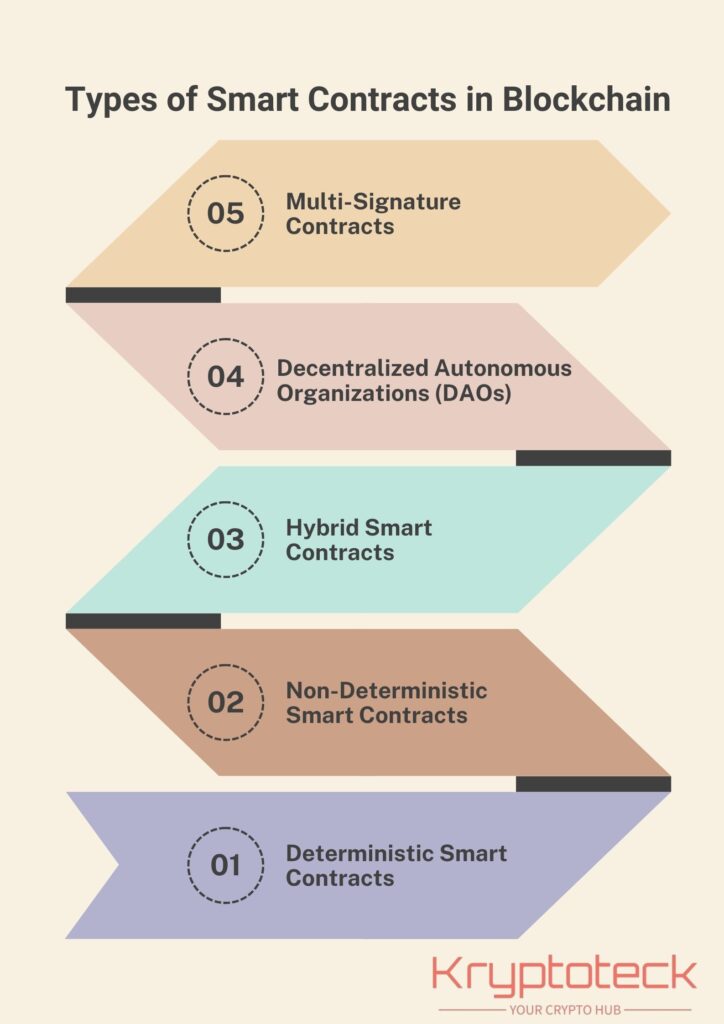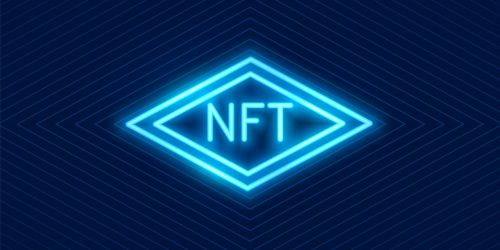In the world of blockchain and decentralized technology, you’ve likely come across the term “smart contracts.” But what exactly are they, and why are they so important in the evolving landscape of digital transactions? Let’s dive into the world of smart contracts, exploring what they are, how they work, and the opportunities they present for you to use in this digital age.
Key Points
- Smart contracts are self-executing digital agreements coded onto a blockchain, automatically enforcing the terms of the contract without intermediaries, ensuring transparency and security.
- They operate by coding contract terms into a programmable script, deploying it on a blockchain, and automatically executing actions when pre-set conditions are met, with verification and storage on the blockchain.
- Smart contracts vary from simple deterministic contracts for basic transactions to complex ones like Decentralized Autonomous Organizations (DAOs) that manage entire organizations.
- A practical example includes using smart contracts for real estate transactions, streamlining processes by eliminating intermediaries and automating the transfer of ownership and payment.
- To monitize smart contracts, opportunities include developing and selling smart contracts, creating decentralized applications (dApps), offering auditing services, and investing in blockchain projects, among other avenues.
What Are Smart Contracts?
Smart contracts automatically execute agreements by coding the contract terms onto a blockchain, streamlining processes and transactions.
- Smart Contract Blockchain Example
Ethereum is a prime example, of using smart contracts to power decentralized applications (dApps) that execute actions like token transfers automatically. - Types of Smart Contracts in Blockchain
Types include simple contracts for transactions, multi-signature contracts needing several approvals, and complex ones used in decentralized finance (DeFi).
What Are Smart Contracts on the Blockchain?
Imagine a traditional contract, like the one you might sign when you buy a house or start a new job. This contract outlines specific terms and conditions that both parties must fulfill. Now, picture this contract in form of a code, automatically executing and enforcing the terms which the parties agree upon, without the need for intermediaries like lawyers or banks. That’s essentially what a smart contract does but on the blockchain.
A smart contract is a type of digital agreement that automatically carries out the terms of the deal, all programmed into lines of code. Smart contracts operate on a decentralized blockchain network, where no single entity controls them and they resist tampering. After deployment, smart contracts automatically execute transactions and enforce agreement terms when the parties meet the specific conditions. This setup eliminates the need for reliance on third parties to ensure the contract’s fulfillment.
How Do Smart Contracts Work?
Smart contracts operate on blockchain platforms, with Ethereum being the most popular for their creation and execution. Here’s a simplified version of how they work:
1. Coding the Contract: The first step is to encode the contract terms into a programmable script. These scripts contain all the conditions that the parties should meet for the contract to take place. For example, when you write a smart contract that releases payment only when a vendor delivers your package.
2. Deployment on the Blockchain: Secondly, upload the contract to the blockchain network. Blockchains are typically a decentralized and unchangeable, system that is secure. Hence, the smart contract is safe from cyber hacking.
3. Execution: When the parties meet the pre-set conditions, the smart contract will automatically execute the agreed-upon actions. For instance, when the vendor delivers your package in our earlier example, the payment will automatically be released.
4. Verification and Storage: The blockchain network verifies the fulfillment of the contract’s conditions and stores the contract and it’s outcome permanently on the blockchain, ensuring transparency and security.
Because of their nature, smart contracts are trustless (you don’t need to trust the other party to fulfill their obligations) and autonomous (they operate independently without external interference). This is a game-changer for various industries, streamlining processes, reducing costs, while also eliminating human error.
Example of Smart Contract Blockchain
To help you visualize how smart contracts work in real-world scenarios, let’s look at a practical example:
Example A: Real Estate Transaction
You’re buying a house, and instead of going through the traditional process involving multiple intermediaries, you decide to use a smart contract. Here’s how it works:
- Terms Agreement: You and the seller agree on the sale price and the conditions for the transfer of ownership.
- Contract Creation: A smart contract is created and uploaded to the blockchain. It states that once you transfer the agreed amount to the seller’s account, the ownership of the property will automatically be transferred to you.
- Funds Transfer: You send the payment to the smart contract.
- Execution: The smart contract verifies the payment. Once verified, it automatically transfers ownership of the property to you and releases the payment to the seller.
- Finalization: The transaction is recorded on the blockchain, providing a permanent and transparent record of the sale.
This example illustrates the efficiency and security that smart contracts brings to the table and especially for complex transactions like real estate, reducing the time and cost associated with traditional methods.
Types of Smart Contracts in Blockchain
Not all smart contracts are the same; they can be categorized into different types based on their complexity and use cases. Understanding these types can help you identify the best use for your needs:

#1. Deterministic Smart Contracts
These are the most basic forms of smart contracts. They operate on simple and logical form. For example, if a payment is made, then ownership is transferred. These contracts are easy to create and are widely used for straightforward transactions.
#2. Non-Deterministic Smart Contracts
These contracts are more complex and can adapt to different conditions or external inputs. For instance, a smart contract could adjust prices based on real-time market data. These contracts require oracles, which are external data sources that feed information into the contract.
#3. Hybrid Smart Contracts
A combination of deterministic and non-deterministic contracts, are used for scenarios requiring both fixed rules and flexibility. For example, a contract can have fixed terms for delivery but allow for price adjustments based on shipping costs.
#4. Decentralized Autonomous Organizations (DAOs)
These are highly complex smart contracts that manage entire organizations. Members of the organization participate in governance, making decisions and voting through smart contracts. DAOs are a revolutionary way to manage businesses and communities without centralized control.
#5. Multi-Signature Contracts
These contracts require multiple parties to approve a transaction before it is executed. They are commonly used in scenarios where consensus among stakeholders is required, such as in corporate governance.
Understanding these types of smart contracts allows you to select the one that best suits your needs, whether it’s a simple transaction or managing a decentralized organization.
How to Make Money with Smart Contracts
You might be wondering how you can capitalize on the growing popularity of smart contracts. Here are a few ways you can potentially make money with smart contracts:
#1. Developing and Selling Smart Contracts
If you have programming skills, particularly in languages like Solidity (used for Ethereum), you can develop self-executing agreements and sell them to businesses or individuals who need them. Many companies are willing to pay a premium for well-coded, secure self-executing agreements.
#2. Creating Decentralized Applications (DApps)
Self-executing agreements are the backbone of dApps, which are applications that run on blockchain networks. By developing and deploying dApps, you can earn revenue through transaction fees, premium features, or advertising.
#3. Offering Smart Contract Auditing Services
With the increased use of self-executing agreements, the need for security auditing has also grown. If you have expertise in blockchain security, you can offer auditing services to ensure that self-executing agreements are secure and free of flaws.
#4. Investing in Blockchain Projects
Many blockchain projects are built around the use of crypto contracts . By investing in these projects, either through direct investment or by purchasing their tokens, you can benefit from the growth and success of these projects.
#5. Participating in Yield Farming or Liquidity Mining
Crypto contracts play a crucial role in decentralized finance (DeFi) platforms. By providing liquidity or staking assets in these platforms, you can earn rewards in the form of tokens or interest.
#6. Creating and Selling NFTs
Non-fungible tokens (NFTs) are another area where crypto contracts are heavily used. By creating and selling NFTs, you can tap into the booming digital art and collectibles market.
#7. Running a DAO
If you’re entrepreneurial, you could start a DAO, raising funds and managing a community-driven project. Profits can be shared among members, or reinvested into the organization.
#8. Providing Oracles
If you have access to valuable data, you can provide Oracle services to feed information into crypto contracts . You can charge a fee for this service, especially if your data is crucial for the execution of specific contracts.
#9. Leveraging Tokenization
You can use decentralized agreements to tokenize assets, such as real estate, art, or intellectual property, and sell these tokens on the blockchain. This can create new revenue streams and make it easier to trade and manage these assets.
#10. Creating Subscription Models
With decentralized agreements, you can create subscription-based services where payments are automatically processed at regular intervals, ensuring a steady stream of income.
Decentralized agreements offer numerous opportunities to make money, whether you’re a developer, investor, or entrepreneur. The key is to identify the right approach that aligns with your skills and interests.
What Are Smart Contracts, and How Do They Work?
To further solidify your understanding, let’s revisit what decentralized agreements are and how they function, but this time, we’ll explore it in a bit more depth.
Definition and Core Concepts of Smart Contracts
At their core, smart contracts are self-executing contracts where the terms of the agreement are written into code. These contracts run on blockchain networks, such as Ethereum, and are designed to automatically enforce and execute the terms without the need for intermediaries. Autonomous contracts rely on a few key components:
- Digital Signatures: These are digital proofs that parties agree to the contract. They replace traditional signatures and are much more secure.
- Consensus Mechanism: This ensures that all nodes in the blockchain network agree on the contract’s state and the execution of it’s terms.
- Oracles: External data sources that provide necessary information to crypto contracts, allowing them to interact with the real world.
How Smart Contracts Work in Practice
When you initiate a smart contract, here’s how the process typically unfolds:
- Setup and Agreement: You and the other party agree on the terms of the contract, which are then coded into a smart contract and deployed on the blockchain.
- Funding: If the contract involves financial transactions, the required funds are deposited into the contract. For example, in a crowdfunding scenario, backers can send funds to the contract.
- Execution: As the contract’s conditions are met (e.g., a specific date is reached, or an external event occurs), the contract automatically executes the agreed-upon actions. For instance, funds can be released to a project creator, or a digital asset can be transferred to a new owner.
- Finalization: Once executed, the contract’s outcome is recorded on the blockchain. This record is unchangeable and transparent, providing proof that the contract was fulfilled as agreed.
Smart contracts are revolutionary because they remove the need for trust and third-party involvement in transactions. They ensure that agreements are executed precisely as intended, with no room for fraud, tampering, or misunderstandings. I provided a checklist below that will help safeguard your smart contract and ensure it’s ready for secure deployment.
Smart Contract Security Audit Checklist
Read Also: Top Crypto Airdrops 2025: How to Get Free Airdrops & Avoid Scams
Conclusion: The Future of Smart Contracts
As blockchain technology continues to evolve, smart contracts will likely play an even more significant role in the digital economy. Their ability to automate, secure, and streamline transactions makes them very valuable in various industries, from finance and real estate to supply chain management and healthcare.
For you, the opportunities are vast. Whether you’re interested in developing smart contracts, investing in blockchain projects, or simply understanding how this technology can impact your industry, now is the perfect time to dive in and explore the possibilities.
By taking advantage of smart contracts, you can not only participate in the future of digital transactions, but also potentially profit from this groundbreaking technology. So, why not dive into the world of smart contracts today? The future is automated, secure, and decentralized—and it’s happening now.
Can I Create Smart Contracts?
Yes, you can create smart contracts if you have some programming knowledge, particularly in languages like Solidity, which is used for Ethereum smart contracts.
Is It Expensive to Create a Smart Contract?
The cost of creating a smart contract varies. While developing the contract can be low-cost if you do it yourself, deploying it on a blockchain like Ethereum incurs “gas fees,” which can fluctuate based on network activity.
Can I Become a Smart Contract Developer?
Absolutely! With the right training in blockchain technology and programming languages like Solidity, you can become a smart contract developer. There are many resources and courses available online to help you get started.
How Do I Write My First Smart Contract?
To write your first smart contract, start by learning Solidity. Then, use an online IDE like Remix to write and test your contract. Begin with a simple contract, like a basic token or a simple agreement, and deploy it on a test network.
Where Do I Start With Smart Contracts?
Start by learning the basics of blockchain technology and the Solidity programming language. Platforms like Ethereum and tools like Remix are good starting points for practicing smart contract development.
Can AI Write Smart Contracts?
AI can assist in writing smart contracts by generating code snippets or automating repetitive tasks, but it cannot fully replace the need for human developers to write and audit contracts due to the complexity and precision required.
Are Smart Contracts Hard to Learn?
Learning smart contracts can be challenging, especially if you’re new to programming or blockchain technology. However, with dedication and practice, it’s an achievable goal.
How Difficult Is It to Write a Smart Contract?
Writing a basic smart contract is relatively straightforward if you have programming experience. However, creating more complex contracts requires a deeper understanding of blockchain technology, security practices, and the specific requirements of the project.
How Do I Run a Smart Contract?
To run a smart contract, you deploy it on a blockchain network like Ethereum. Once deployed, the contract will execute automatically when its conditions are met, and you can interact with it through transactions.







2 comments
Thank you for your sharing. I am worried that I lack creative ideas. It is your article that makes me full of hope. Thank you. But, I have a question, can you help me?
Can you be more specific about the content of your article? After reading it, I still have some doubts. Hope you can help me.